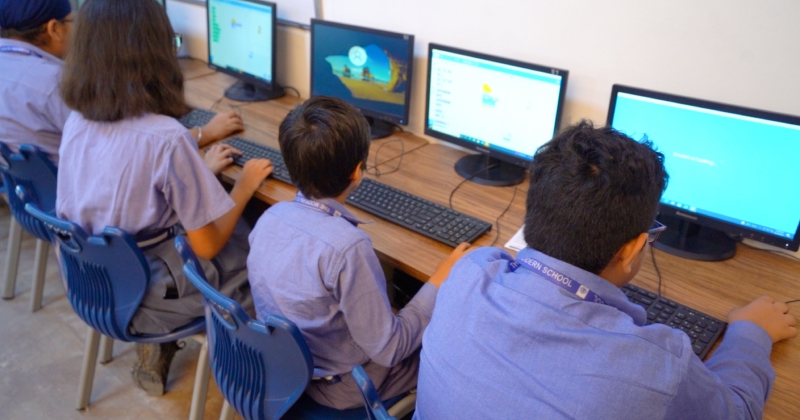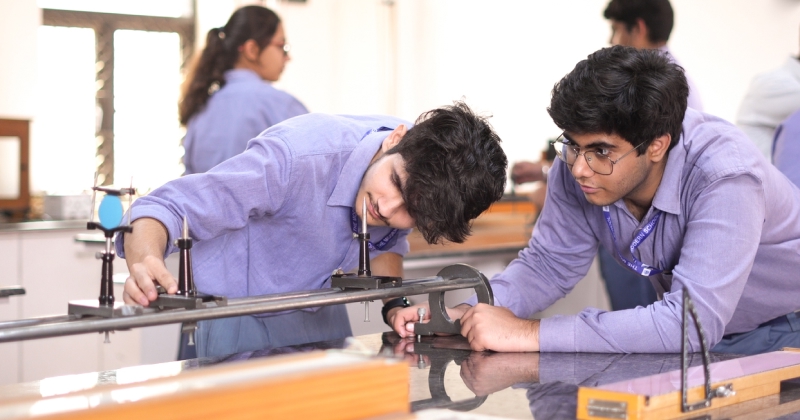
Integrating AI in Education: How Will AI Shape the Future of Learning?
Across classrooms worldwide, a subtle yet significant transformation is underway—driven by the rise of Artificial Intelligence (AI). From personalised learning platforms to AI tutoring systems, the new technology is reshaping the way children absorb knowledge, think critically, and engage with their environment. Yet, as with any powerful tool, its use demands caution and responsibility. At Modern School Kundli, we believe AI should be integrated into education with care, guided by ethical principles, a commitment to child development, and a deep respect for environmental sustainability.
The Potential of AI: A Learning Companion, Not a Substitute
AI holds great promise in enhancing education, particularly during a child's early learning years. Picture a student who finds math challenging being supported by an AI tutor that adapts its approach to suit their individual learning style. Or a child with dyslexia receiving instant, tailored reading assistance that helps them move forward with greater ease and confidence.
At Modern Kundli, one of the Best modern schools in Sonipat, we see AI not as a replacement for human educators but as an assistant that can personalise education, reduce repetitive tasks for teachers, and create space for more meaningful student-teacher interaction. In fact, AI can support inclusive learning by helping children with special needs, offering language translations, and providing extra coaching where needed.


The Brain Factor: Insights from the MIT Study
A recent 2025 study by MIT has brought fresh insight into the evolving discussion on AI in education. The findings reveal that extended exposure to AI-generated content among children aged 5 to 10 may delay certain aspects of brain development, particularly in areas linked to imagination, creativity, and independent problem-solving. While the study highlighted improvements in memorisation and information retention, it also indicated a dip in brain activity connected to emotional and creative thinking.
This doesn’t suggest that AI has no place in classrooms, but it does underscore the need for mindful integration. Children thrive when they have time to wonder, explore, and even get bored, because that’s when imagination comes alive. An over-dependence on AI risks limiting the full spectrum of learning experiences.
At our school, we see this research as a reminder to keep balance at the core of our approach. Storytelling, nature walks, screen-free exploration, and hands-on projects remain vital parts of our curriculum. We believe AI can support learning, but it can never replace the richness of real-world interaction, curiosity, and creativity.
Ethical Concerns: How Much Is Too Much?
While AI offers exciting possibilities for enhancing education, its growing role in the classroom brings several ethical concerns to the forefront.
Data privacy is a major issue: AI platforms often collect and analyse sensitive information about children. Who has access to this data, and how securely is it stored?
Algorithmic bias is another worry. When AI systems are trained on skewed or incomplete datasets, they can unintentionally reinforce social and educational inequalities.
And most importantly, can machines truly nurture qualities like empathy, imagination, and emotional intelligence—the very traits that make us human?
At our school, we believe that technology should support learning, not replace the human element. Every child is a unique individual, not just a user or data point. That’s why any AI tool we introduce must meet rigorous standards for transparency, child safety, and age-appropriate usage.
We also ensure that our approach to AI is inclusive and participatory, engaging teachers, parents, and students in open dialogue. We continue to align our practices with evolving ethical standards set by child development experts and educational authorities.
Environmental Impact: The Unseen Carbon Footprint of AI
As we embrace AI to enhance learning, it’s equally important to recognise its environmental cost. Every AI tool, be it a virtual assistant or a learning platform, relies on energy-intensive data centres that consume significant electricity and water. In fact, recent studies suggest that training just one large AI model can produce as many carbon emissions as five cars over their entire lifespan.
In today’s climate-aware world, such statistics urge us to use AI thoughtfully. At our school, we promote a sustainable, value-driven use of technology. We are actively exploring collaborations with eco-conscious tech providers and advocate for digital minimalism, employing AI only when it genuinely enhances the learning experience, without compromising our environmental responsibility.
What Lies Ahead: Building a Human-AI Balance
At our Modern School in Sonipat, we don’t reject AI—we approach it with cautious optimism. AI has immense potential to support education: enabling personalised learning, helping teachers pinpoint individual challenges, translating content across languages, and enhancing student engagement through smart, interactive tools.
Yet, as we look to the future, we stay firmly grounded in what truly matters: genuine human connection, ethical use of technology, environmental responsibility, and a child-first approach to learning.
Our vision is clear: to build a future where AI enhances the classroom experience, without replacing the joy of hands-on learning. A future where children explore, question, collaborate, and play, while also benefiting from the thoughtful use of advanced educational technology.
Final Thoughts
The future of education is not just digital: it’s ethical, balanced, and deeply human. At the Top CBSE School in Sonipat, we’re not just preparing students for AI-powered classrooms. We’re preparing them to be curious, conscious, and compassionate learners in a world shaped by both technology and timeless human values.